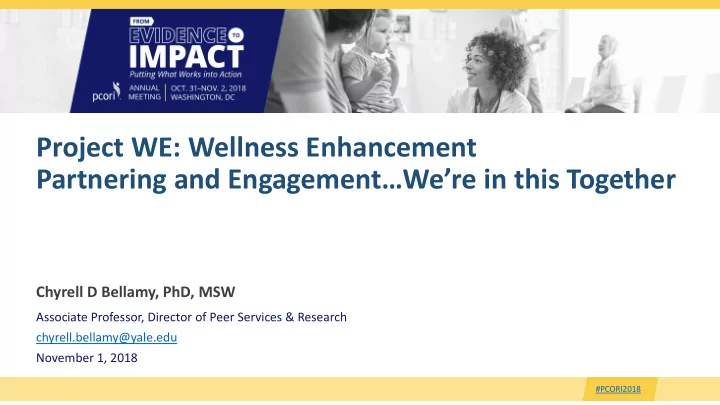

Project WE: Wellness Enhancement Partnering and Engagement…We’re in this Together Chyrell D Bellamy, PhD, MSW Associate Professor, Director of Peer Services & Research chyrell.bellamy@yale.edu November 1, 2018 #PCORI2018
Chyrell Bellamy • Has nothing to disclose. yale program for recovery and community health 2 • November 1, 2018
Objectives At the conclusion of this activity, participants should be able to • Objective 1: Identify ways to foster relationships and engage community in research activities • Objective 2: Learn ways that partnership works • Objective 3: Describe ways partnership enhanced research 3 • November 1, 2018
Starting with the Why? • People with Serious Mental Illness are dying 25 years earlier than the rest of society 1 • Can we collectively figure out a way to do something about it? 1 National Association of State Mental Health Program Directors Medical Directors Council, (2006). Morbidity and Mortality in People with Serious Mental Illness 4 • November 1, 2018
Increasing Health Care Choices and Improving Health Outcomes Among Persons with Serious Mental Illness Overall aims of the PCORI funded study: • Used mixed me thods to determine which patients choose to use which services and what are the short and longer-term outcomes for patients in Wellness Center (co-located primary care) (N=786). • Based on participant interviews , identified barriers to and facilitators of access, service use, and improvements in person-centered outcomes and elicited suggestions for changes and additional interventions to improve health of people with mental illness. • With persons in recovery developed and piloted a new peer-led community-based intervention in enhancing access and choice, and improving person-centered health outcomes, among 37 clients who reported no improvement in their health as a result of their use of the Wellness Center during the first year of the project. Today we will discuss lessons learned from our patient engagement and participatory research. 5 • November 1, 2018
The Importance of Patient Engagement • Patient/client/stakeholder involvement in research dates back to the 1980s in the medical field - maternal health, cancer, and HIV – particularly in early 90s. • Pervasive fears and skepticism in parts of the research community • “Patients should not interfere in processes which they know nothing about” 1 • Requires time, patience, and guidance, particularly at the outset 2 • Despite these challenges, the evidence from this country and around the world suggest that many benefits await such an endeavor. • Evidence shows overall positive effect on services and benefits for the service users 2 • Benefits include 3 • facilitating empowerment • enhancing relevance • generating novel research 1 Caron-Flinterman, Broerse, & Bunders, 2005, p. 2576; 2 Palmer et al., 2009; 3 Beresford, 2007; Involve review 7 • November 1, 2018
Patient Engagement in the Project • 3 Patients were co-researchers , hired as full or part time (with benefits) Yale Research Assistants • 2 Patient stakeholders on Research Team, participated in the bi-weekly research meetings (received stipends) • 6 Patients were on the Advisory Committee (met 4-6+ times per year) • 5 research staff (in addition to the above) also self-disclose as “patients” • 1 CMHC/Wellness Center Stakeholder served as a primary stakeholder on the research team 8 • November 1, 2018
Partnering Examples • Patient partners convened advisory board and provided training on leadership and board participation. • Stated they were not looking for people to be tokens • Advisory members participated in conducting research – shadowed qualitative interviews and assisted in analysis. • Patient partners were co-researchers • Involved throughout research • Co-developed an intervention based on input from patients in the study • Conducted meet and greet to engage participants in the intervention component of the study 9 • November 1, 2018
The WE Harambee Intervention • Based on the 8 dimensions of Wellness 10 • November 1, 2018
Findings: Harambee Intervention Compared to the control group, certain outcomes for participants in the Harambee intervention significantly improved: 1. Decreased number of visits to the emergency department for psychiatric/substance abuse reasons in the past 30 days 2. Decreased alcohol use 3. Increased overall wellness across the 8 dimensions 11 • November 1, 2018
12 Findings (cont’d) Compared to the control group, certain outcomes for participants in the Harambee intervention significantly improved: • How much participants felt they had input into their treatment plan increased • Whether they would choose their current outpatient care if it were free increased 12 • November 1, 2018
Discussion: Implementation and Next Steps • Co-location and evidence based practices alone did not show significant improvement in health indicators. • However, more time is needed to be able to assess whether changes would occur over time. • A community-based peer-led holistic health intervention based on the 8 dimensions of wellness, social determinants and structural competency has promise as an augmented service for people with mental illness that may not be improving on health and social indicators. 13 • November 1, 2018
Discussion (cont’d) • Future research is needed to further test the target mechanisms of this intervention and its effectiveness over time. • Involvement of patients as co-researchers benefited all aspects of the research process. Patients involved in this research project were able to enhance the team’s capacity by • selecting relevant patient outcome measures • recruiting patients to projects • co-developing interventions • collecting, analyzing, disseminating and reporting on data 14 • November 1, 2018
Learn More • www.pcori.org • info@pcori.org • #PCORI2018 15 • November 1, 2018
Thank You! Chyrell D Bellamy, PhD, MSW Associate Professor chyrell.Bellamy@yale.edu November 1, 2018 16 • November 1, 2018
Recommend
More recommend